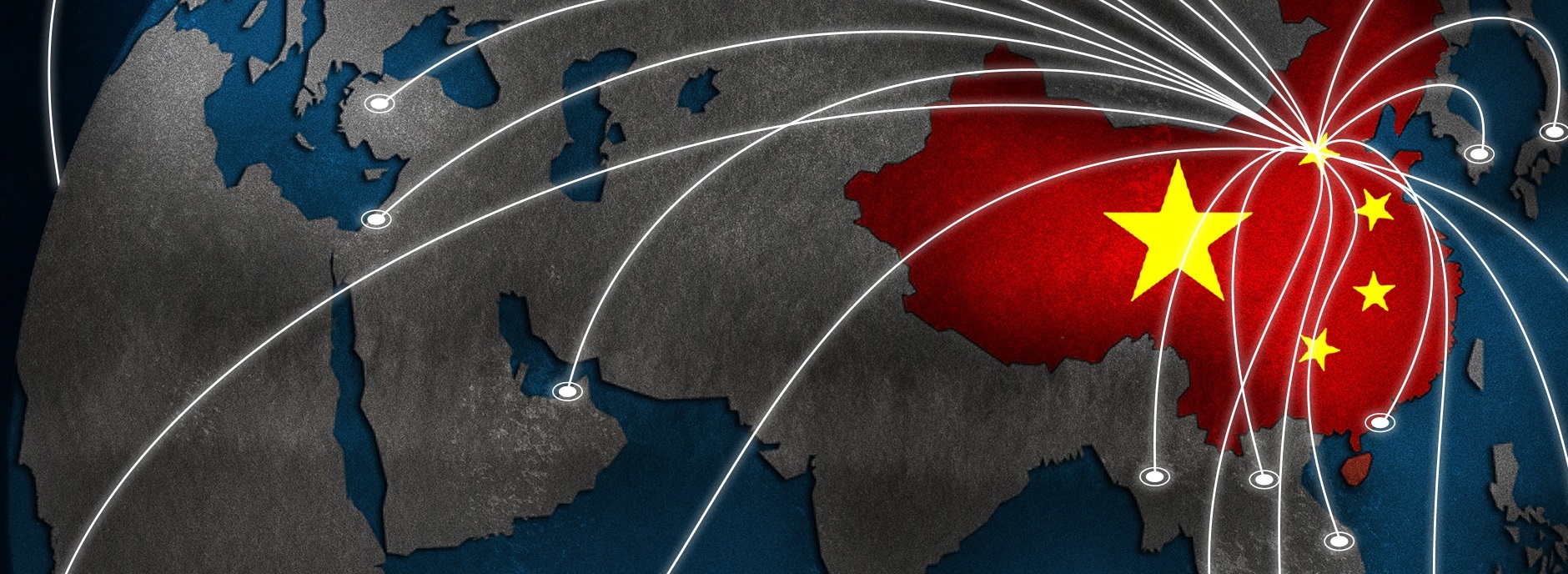China uses National Security Law to threaten British NGO in further escalation
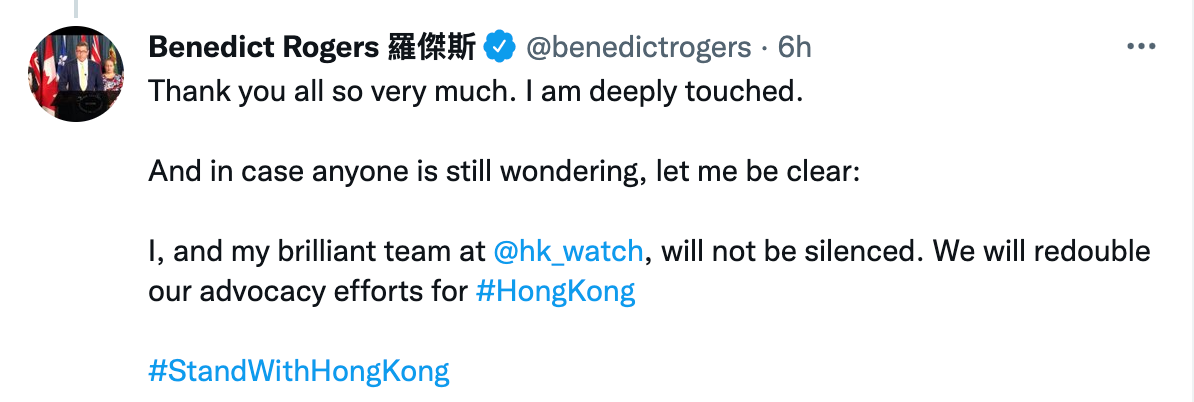
While the world is focused on Russia’s brutal invasion of Ukraine, Hong Kong quietly ramps up the threats against human rights … but this time the threats are delivered well outside its borders.
In a letter dated 10 March, Hong Kong national security police ordered Benedict Rogers, the founder of UK-based rights group Hong Kong Watch, to take down the group’s website, accusing Rogers and the organization of violating Article 29 of the territory’s draconian National Security Law (NSL). To quote the letter, Hong Kong Watch (and Rogers) are suspected of “colluding with a Foreign Country or with External Elements to Endanger National Security.”
The website’s “crimes” are the publishing of articles covering human rights abuses in the city, something that would not have raised a legal eyebrow before Beijing imposed the NSL in 2020.
- HKW and Rogers are neither from or in Hong Kong (Rogers has been banned from entering from at least 2017), raising questions about the logic of a law that accuses a foreigner overseas of collusion with a foreign country when they are in a foreign country.
- HKW's website is not based in Hong Kong and was in fact at least partially blocked in the city last month, meaning it would be inaccessible in the territory.
- This is the first confirmed case of a fully foreign entity and individual targeted by Hong Kong under the NSL.
The first time Hong Kong went after activists overseas, including one Hong Kong-born US citizen, was in 2020. Inside Hong Kong, the NSL has led to the shuttering of more than 50 civil service groups and the arrests of more than 150 people, including foreign citizens.
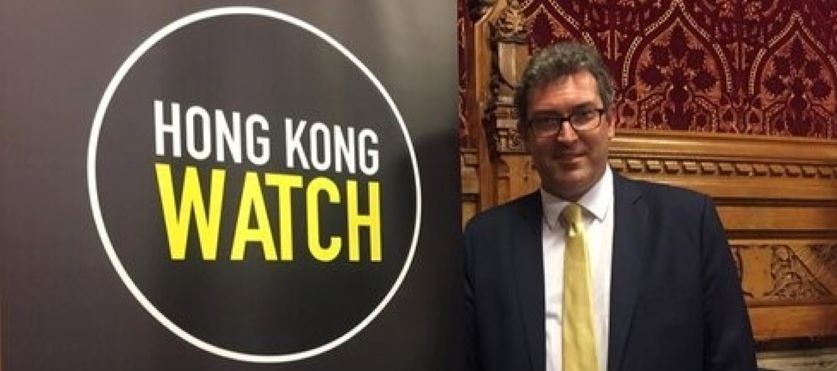
The letter warns Rogers that if he does not comply within 72 hours, he faces a possible fine of HK$100,000 and jail time of up to one year. Article 29, however, specifies that the criminal punishment for those working to impose sanctions (against Hong Kong or China) should be from three and 10 years of imprisonment, while the maximum sentence under Article 29 for grave offenses is life in prison. The possibility of imprisonment would render Benedict Rogers a potential target for an INTERPOL red notice (or diffusion), and upon apprehension, of being extradited to Hong Kong (or China). Both Portugal and the Czech Republic continue to maintain extradition treaties with Hong Kong, in violation of a call from the EU Council for all EU member states to cancel such. A long list of EU member states, even some which have canceled their extradition agreements with Hong Kong, maintains such with mainland China still.
As can be seen from the above image of one of Rogers’ latest tweets: he is not fazed by these threats.
“I, and my brilliant team at @hk_watch , will not be silenced,” he wrote. “We will redouble our advocacy efforts for Hong Kong.”
Expansion of transnational repression
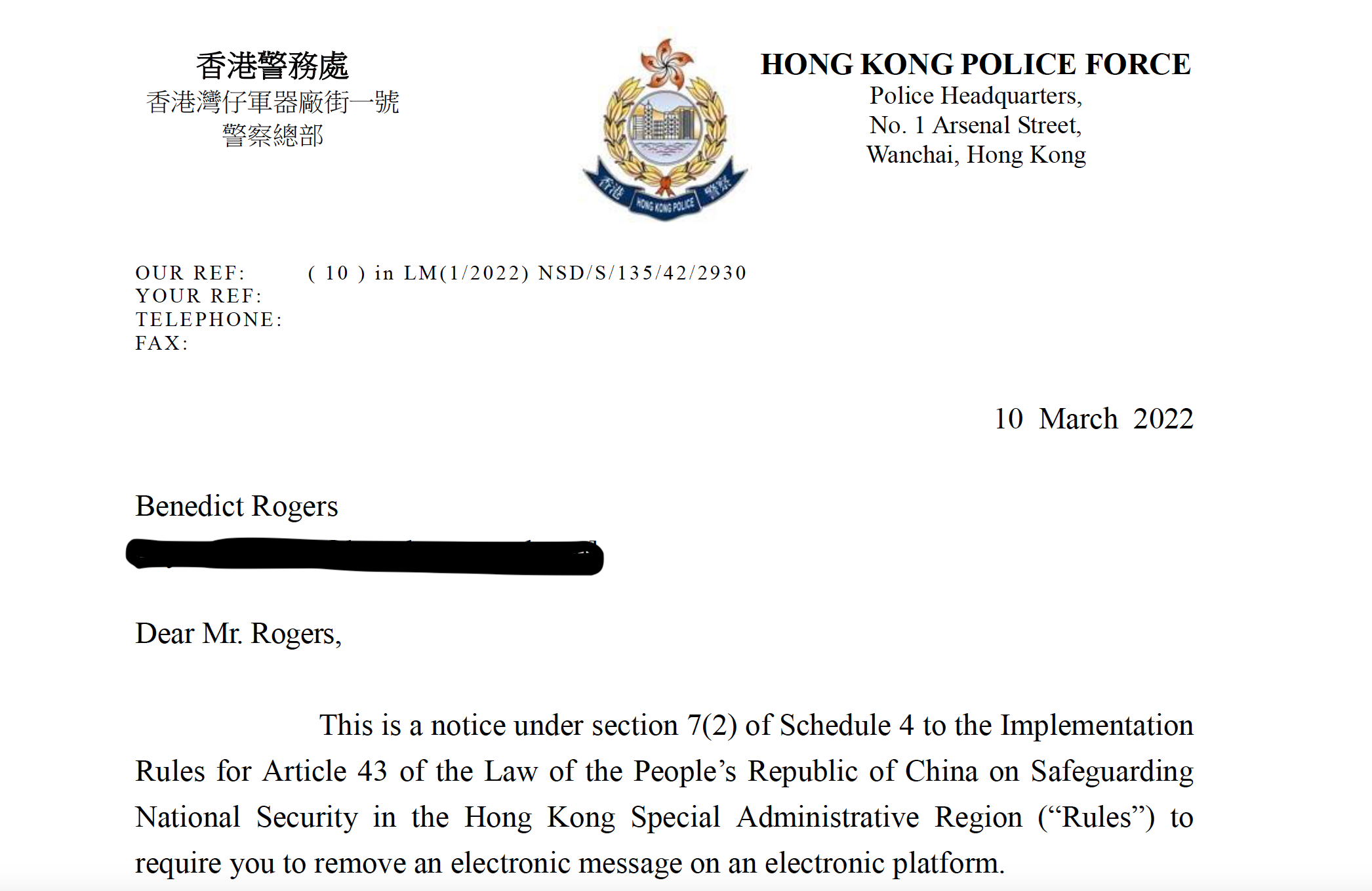
What is most concerning about this new development, however, is that it marks a ramping up of transnational repression coming from Beijing and now also Hong Kong.
Article 38 of the NSL, allows for suspects acting and living outside of Hong Kong to be targeted by this law. It in fact allows Beijing and Hong Kong to criminalize the exercise of democratic freedoms by foreign citizens, in foreign lands, which is an example of what is happening here; Benedict Rogers, a British man running a British NGO, in the UK, entirely in line with UK law and democratic rights, is now being threatened with an international manhunt and imprisonment.
We are seeing a pattern where repression started from domestic only, then spreading to Chinese communities overseas, whether they be Chinese passport holders or simply foreign citizens but ethnically Chinese, and now to basically anyone who is critical of the politics of Beijing and Hong Kong.
The stories published on Hong Kong Watch are no different from the stories we publish on our website, or the many dozens of other human rights NGOs that cover China, or even media outlets that report on Chinese Communist Party repression. They are all based in countries that protect the freedom of speech, but China and Hong Kong are now using their domestic laws to reach across boundaries to silence or potentially punish them.
This is an attack on the fundamental freedoms of people living thousands of miles from Hong Kong and China.
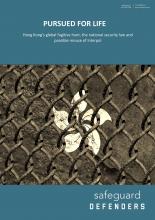
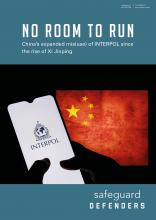 The worry is that people like Rogers, and the many Hongkongers living in exile, will not be able to travel as freely once Beijing and Hong Kong use international mechanisms like INTERPOL to seek their extradition. The use of INTERPOL to chase suspects under this law is expressly against the organization’s charter.
The worry is that people like Rogers, and the many Hongkongers living in exile, will not be able to travel as freely once Beijing and Hong Kong use international mechanisms like INTERPOL to seek their extradition. The use of INTERPOL to chase suspects under this law is expressly against the organization’s charter.
Safeguard Defenders first covered this threat in a recent report, Pursued for Life, which exposed how Hong Kong is threatening to use all possible channels to seek the return of democracy activists under the NSL, and explored it further in No Room To Run, a report on how China's use of INTERPOL has changed since Xi Jinping came to power, and how it has evolved alongside China's growing long-arm policing overseas.
Eventually, this could mean that anyone who speaks out about human rights abuses in China and Hong Kong will have to choose between freedom of movement and freedom of expression – that is a direct attack on the international rules-based order.
This latest move to threaten Rogers comes on the heels of last year's warnings from the UK government to Hong Kong critics not to travel to countries with extradition treaties with Hong Kong to avoid getting caught up in the NSL.
Sanctions, not just words
Governments must immediately condemn these actions by Beijing and Hong Kong, call them out whenever they come to light, and seek to block further escalation of this practice with the use of strong actions and not just words.
One response is to immediately and publicly impose sanctions, such as Magnitsky human rights sanctions against individuals in power who are responsible for ordering this attack on Hong Kong Watch and Rogers. A powerful message to Hong Kong (and Beijing) is needed, and one that makes clear that transnational repression will not succeed.
As Rogers himself wrote on his website:
[We] will continue to call for Hong Kong officials to face sanctions for their destruction of the city’s autonomy and freedom. The irony is that many of Hong Kong’s police officers and government officials today hold foreign passports, send their children to be educated in the West, and have their savings held in Western banks overseas to avoid Xi Jinping’s ongoing “corruption” crackdowns - and so the likelihood is that these sanctions would be quite effective.
The response from the UK, although swift, has not been strong enough.
U.K. Foreign Secretary Liz Truss published a statement on the same day the news broke saying that:
“Attempting to silence voices globally that speak up for freedom and democracy is unacceptable and will never succeed.”
Rogers told Safeguard Defenders:
"These letters - one from the Hong Kong Police and one from the Hong Kong National Security Bureau - are a shocking and outrageous assault on freedom of expression well beyond Hong Kong's borders. The National Security Law does have an extraterritoriality clause, meaning it can be used against anyone, anywhere in the world, any time, but we never expected that to be actually applied in practice. Certainly, Hong Kong Watch will not comply, we will never remove our website, we will never stop advocating for Hong Kong. On the contrary, we will redouble our work, as our voice for Hong Kong is needed now more than ever."
*Full disclosure: Safeguard Defenders’ Laura Harth is also a member of Hong Kong Watch’s Advisory Board.
